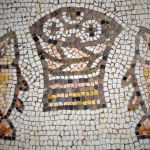We humans have a long and storied tradition of turning divinity into a thing. One finds the critique of idolatry, carving wood and stone and worshipping them, all the way back in the pre-Exilic period of the Jewish Exile. Ancient figurines unearthed in burial chambers are hypothetically understood to be iconic divinities by archeologists.
Christianity is not immune to this temptation either. As Roman culture and Christianity blended in late antiquity, the use of art to craft images and icons contributed to the way the church told the story of God, the Jewish people and the saints of Christendom. The debates about the use of art even managed to be such an issue that one of the major seven ecumenical councils had to deal with the relation of the Platonic copy, the object (art), to the reality (the Platonic form) of God.
Enter Zwingli with his over the top iconoclasm cleansing his Protestant churches of everything visual. Now only the auditory remained. Evidently God preferred speech and language and text. Theories of inspiration and their corollary, critical interpretation of Scripture, arose within a generation of each other in the 17th century. The Battle for the Bible had begun. 400 years later and this battle is still raging.
Out of the ashes of doctrinal conflicts and a perceived loss of holiness codes, charismatic Christianity was born. The shift from pre-modernism to modernity was complete. Trust in Holy Mother Church worked until the Reformation, then came trust in the Bible. As that was decimated by the conflicts with science (including the historical and human sciences), the burden shifted to trusting in our individual experiences. Charismatic Christians have completed this trifecta of turning God into an object. What do I mean?
If one could say that the ‘authority of the Father’ framed Roman Catholic ecclesiology, and one could also say that the ‘authority of the Son [as Word]’ framed Protestantism, then one can aver that ‘the authority of the Holy Spirit’ is the theological frame of the modern Pentecostal/Charismatic movement. However, while the charismatic is fond of claiming ‘God is doing a new thing’, nevertheless the reality is that this way of reifying God is the same old song and dance Christianity has been boogying to for 2,000 years.
Charismatic Christianity manifests in itself the problems inherent within the first two paradigms (those of the RC ‘Father’ ecclesiology and those of Protestantism’s ‘Son’ bibliolatry): in both cases authority is understood and manifested top down. Charismatic Christianity is replete beyond imagination with personality cults, little kingdom builders and every manner of self-styled apostle, prophet, bishop and fool one could imagine. Like the medieval church with its bloated hierarchy combined with the Protestant fundamentalist’s desperate need for certainty, the contemporary charismatic has surrendered their identity to a corporate monster, that of the ladder ascending individual, the Type-A personality, the capitalistic plunderer, the colonialist preacher. All of these merge into what is called ‘leadership models’ so that Charismatics gullibly are led to sit and feed at troughs of empty promises. Little wonder that Charismatic Christianity and Multi-Level marketing scams have so much in common both as to methods and results!
If one could argue that Christendom had turned the ‘Father’ into a thing in erecting a massive authoritarian structure (literally, the Vatican), and if one could argue that Protestantism had done the same thing with the ‘Son’ (identifying Jesus the Word with the Bible as the Word), it is also possible to argue that Charismatic Christianity has also reified God by identifying the divine (the Holy Spirit) with human experience. Thus it is no surprise that the basis of authority in ‘Holy Ghost’ groups and churches is the self, always conceived of in Platonic-Cartesian terms as the autonomous individual. Anecdotal stories suffice as ‘proof’, rational thinking is spurned, and mimetic chaos reigns as each new ‘leader’ seeks to find some wee bit of authenticity or revelation or experience that has not yet been on offer previously, market that said ‘scheme’ and create a dynasty that can be passed on to his (for these movements tend toward patriarchy) children. We see this repeated a countless thousand fold time in Charismania.
This is not to say that there is not or cannot be a genuine expression of the Gospel in Charismatic Christianity. Just as the history of Roman Catholicism and Protestantism can claim their St Francis’ or Martin Luther King Jr’s, so it can be certain that there will be some from this movement who will stand out. History will be the judge of that. What we are called to do is to help the charismatic recognize that the very ground on which they stand is shifting sand and NOT the gospel. Personal experience has never been the basis for the proclamation of the Gospel. Personal experience, like the biblical text itself, like the church herself, are all but witnesses pointing to a greater reality, an event in history, a life lived.
In other words, God cannot be claimed, chained or caged. The Father cannot be caged in an institution, nor can the Son be chained to a book, nor can the Spirit be claimed as a possession. The Spirit is not a thing, and if the Spirit is Jesus (2 Cor 3) and if Jesus is Lord (Phil 2), then our relation to the one God is never that of master, nor is God a reality to be manipulated. Just as the Roman church of medievalism manipulated ‘the Father’ to create a system of penance, just as Protestants have manipulated the ‘Son’ to create a theory of revelation which was used to control, colonize and castigate humanity so now Charismatics manipulate the ‘Spirit’ to create experiential economies of exchange, hierarchies of experience, and new ways to fleece the gullible flock of humanity desperate to hear a good word, a healing word.
Charismatics are fond of saying at this point, “But look at all the good that has come out of this movement.” Really? Every movement in its own time claims this, but historically is found lacking. So shall it be with Charismania. One hundred years from now all of the manipulation, the schemes, the lies, the distortions and the bullshit will all be known. You cannot make God into an idol and get away with it. God is not a thing. As Karl Barth tried to remind us “God is God.”
If you are a charismatic and have read this far, please note I am not trashing this movement. I am calling Charismatics to repentance. Unlike you, I am not persuaded that your movement “is a movement of the Holy Spirit.” I see way too much mimesis, capitalistic venturing, patriarchy, hierarchy, manipulation, fear, greed and narcissism, not to mention Gnosticism to even consider that it (the charismatic movement) is something “new” from God. Not by a long shot. It is just the same old Christianity repackaged once again, all of your anecdotal signs and wonders notwithstanding. I know you don’t like it when I critique your movement. Usually that is done by cessationists or neo-Calvinists.
I acknowledge a quantum universe, hence unusual or extraordinary experiences are neither anathema or forbidden by me. I refuse, however, to believe in a god of the gaps or a deus ex machina. Faith in that kind of God died at Calvary for those with eyes to see. My prayer is that all forms of Christianity would awaken to the beauty, inspiration and true transforming power of the Gospel of Jesus. There have been glimpses of it throughout all forms of Christendom in her 2,000 year history. What makes today different are the way the sciences and theology are converging toward an integral model of reality (or a post-foundationalist critical realism). We live on the precipice of a time which harbors all manner of future scenarios. Ours is the generation that will make the choices that will bring about either apocalypse or healing. It is time for Christianity to pull her head out of the sand and become genuine Jesus Followers, light to a world in darkness.














